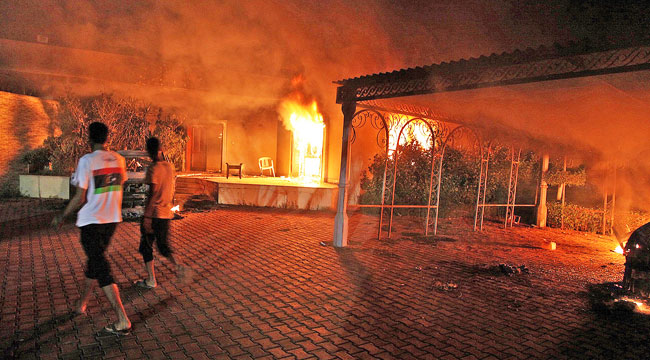
An accused Benghazi ringleader, Ahmed Abu Khattala, has been convicted of 4 out of 18 charges in his trial for the two 2012 attacks in Libya. Of those charges, he’s off the hook for the most serious ones — multiple counts of murder for the deaths of a U.S. ambassador, a State Department officer, and two CIA contractors. However, Abu Khattala has been convicted on both associated terrorism charges and weapons offenses.
Following the end of the 7-week trial, Abu Khattala becomes the first defendant who has been successfully prosecuted for the Benghazi attacks, which have stayed in the news not only for the trial itself but also the House Select Committee’s investigation that found no wrongdoing by then-Secretary of State Hillary Clinton. The New York Times has more on the verdict and sentencing:
Mr. Khattala was convicted on four counts — including providing material support for terrorism, destroying property and placing lives in jeopardy at the mission, and brandishing a firearm during a crime of violence — but acquitted on 14 others. He faces up to 60 years in prison for the four convictions.
The mixed verdict showed the difficulty of prosecuting terrorism cases when the evidence is not clear-cut. The outcome was reminiscent of the 2010 federal trial of Ahmed Khalfan Ghailani, a Tanzanian man and former Guantánamo Bay detainee who was charged in federal court as a conspirator in the 1998 bombings of two American embassies in East Africa that killed hundreds. Mr. Ghailani was acquitted of most of the charges, including each murder count for those who died, but convicted of one count of conspiracy and sentenced to life in prison.
Part of the dilemma faced by prosecutors — partially due to the fact that much of the evidence was destroyed by fire and looting — is that they were unable to prove that Abu Khattala played a direct role in gunfire or setting any of the blazes in the attack. However, the terrorism charges resulted in conviction because of witness testimony that proved he helped orchestrate and plan the attacks. Abu Khattala’s defense attorneys attempted to argue that he did not participate in the attacks but only approached them as “a bystander.” However, his cell phone records and other evidence showed otherwise.
(Via New York Times & Washington Post)
